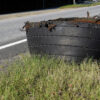Recent heavy rains put the spotlight on one of the most common yet extremely difficult to resolve environmental concerns – untreated or partially treated sewage getting into our rivers, lakes and streams. Inflow of rainwater through cracked pipes or faulty manhole covers and infiltration of groundwater through deteriorated sewer lines can overwhelm a sewer system and send sewage into waterways.
We call these SSOs, or sanitary sewer overflows. Bodies of waters contaminated by sewage can carry E. coli and other bacteria and pose health risks to the public.
Of course, inflow and infiltration of water aren’t the only causes of SSOs. Blockages of sewer lines from household grease disposal or roots, line breaks, power failures, vandalism, inadequate sewer system capacity or design, and equipment failures can all cause sanitary sewer overflows. In fact, the country’s aging and outdated infrastructure, including municipal sanitary sewer systems, creates special challenges for those systems and environmental regulators as well.
The Alabama Department of Environmental Management takes sanitary sewer overflows very seriously due to the obvious public health risks they produce. We are committed both to warning the public of SSOs when they occur and, more importantly, working with the sewer systems to remedy the problems that led to the SSOs.
We also hold them accountable, like all polluters, when they fail to take adequate steps to prevent SSOs. Our job is to protect the state’s environment and its citizens’ health from violations that put them at risk – regardless whether the violators are municipal systems or private operations.
The issues facing the Guntersville Water and Sewer Board are an example of the complexities of the SSO problem. An environmental group is threatening to sue the city over SSOs into Lake Guntersville and area waterways. In its letter of intent to sue, the group says it wants a court injunction to force the Water and Sewer Board to stop the SSOs, and the group’s founder was quoted in a recent news story saying it was taking this action to enforce the Clean Water Act because ADEM wasn’t.
Certainly, ADEM recognizes and supports the right of citizens and citizen groups to take such legal actions. In fact, that right is ensured under the Clean Water Act.
The problem is, Guntersville already is taking steps to repair and upgrade its sewer system. With the technical assistance and oversight of ADEM.
Since a 2013 consent order with ADEM, the Sewer and Water Board reports it has spent more than $18 million on repairs and improvements to its wastewater system. It plans to spend another $5.5 million over the next two years.
Not unlike many sewer systems across the country, the system faces many issues in resolving its SSO problems. Inflow and infiltration at vulnerable locations due to heavy rainfall, equipment failures, increased demands due to commercial and industrial growth, insufficient capacity and even a lightning strike were cited by the system’s engineer as contributing to its problems.
The cost of repairs and upgrades to wastewater systems are borne by the residents and businesses that use the systems through higher sewer fees.
While many citizen lawsuits that attempt to force compliance might be well-intentioned, they often add the cost of lawyers, court fees, etc., but do little or nothing to resolve the system’s SSO problems.
ADEM’s goal is for the problems to be fixed. That’s why we take enforcement actions which sometimes lead to consent orders requiring the violators to take specific steps, with specific timelines, to address and remedy the violations. Consent orders are enforceable in a court of law, and they don’t necessarily absolve violators of penalties assessed against them.
Here are some other things ADEM does to protect the environment and the public from SSOs:
- Offer low-interest loans and assist in obtaining other funding to help wastewater systems upgrade their infrastructure.
- Provide technical assistance to help systems optimize operations and reduce costs.
- Provide operator training and certification.
- Assist in the development of SSO response plans.
- Inspect systems on a regular basis for potential problems that could lead to SSOs.
- Require wastewater systems to immediately notify the public of SSOs.
As the director of ADEM, I take personally any suggestion that this agency is lax on holding water and sewer systems – indeed any polluter – accountable for any violations that affect public health or the environment. Our state water rules match or exceed federal EPA requirements. In addition, the EPA consistently ranks ADEM among the leading state environmental agencies in the Southeast in levying fines when violations occur.
But we understand, and we want the public to understand, that the true objective is to stop and prevent violations through the most effective means. Just filing lawsuits doesn’t get it done.


















































